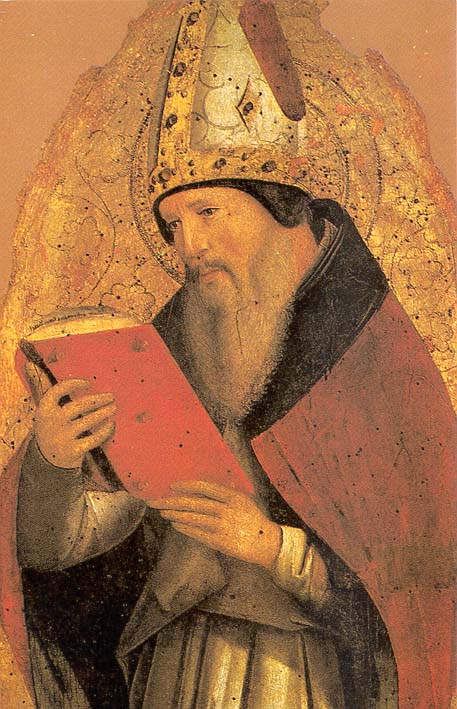|
Saint Augustine of Hippo (354-430 A.D.)

Saint Augustine made no
secret of his admiration for Plato; In his work entitled The City of God
(Book 8), Augustine wrote:
Among the disciples
of Socrates, Plato
was the one who shone with a
glory which far
excelled that of the others, and who not
unjustly eclipsed
them all. ... For those who are praised as having most closely followed
Plato, who is
justly preferred to
all the other philosophers of the Gentiles ... Of which three things, the first is understood to pertain
to the natural, the second to the rational, and the third to the moral part
of philosophy. For
if man has been so created as to attain, through that which is most
excellent in him, to that which excels all things,—that is, to the one
true and absolutely
good God, without
whom no nature exists, no doctrine instructs, no exercise profits,—let Him
be sought in whom all things are secure to us, let Him be discovered in whom
all truth becomes
certain to us, let Him be loved in whom all becomes right to us. ...
... It is evident that none come nearer to us than the
Platonists. ... The
Platonic
philosophers ... have recognized the
true God as the author of all things, the source of the light of
truth, and the
bountiful bestower of all blessedness. And not these only, but to these
great acknowledgers of so great a
God, those
philosophers must
yield who, having their mind enslaved to their body, supposed the principles
of all things to be material; as Thales, who held that the first principle
of all things was water; Anaximenes, that it was air; the
Stoics, that it was
fire;
Epicurus, who
affirmed that it consisted of atoms, that is to say, of minute corpuscles;
and many others whom it is needless to enumerate, but who
believed that
bodies, simple or compound, animate or inanimate, but nevertheless bodies,
were the
cause and
principle of all things. ...
... Whatever
philosophers,
therefore, thought concerning the supreme
God, that He is
both the maker of all
created things, the light by which things are
known, and the good
in reference to which things are to be done; that we have in Him the first
principle of nature, the
truth of doctrine,
and the happiness
of life,—whether these
philosophers may be more suitably called Platonists, or whether they may
give some other name to their
sect; whether, we
say, that only the chief men of the Ionic school, such as
Plato himself, and
they who have well understood him, have thought thus; or whether we also
include the Italic school, on account of Pythagoras and the Pythagoreans,
and all who may have held like opinions; and, lastly, whether also we
include all who have been held wise men and
philosophers among
all nations who are discovered to have seen and taught this, be they
Atlantics, Libyans, Egyptians, Indians, Persians, Chaldeans, Scythians,
Gauls, Spaniards, or of other nations,—we prefer these to all other philosophers, and
confess that they approach nearest to us. ...
... Certain partakers with us in the
grace of
Christ, wonder when
they hear and read that
Plato had conceptions concerning
God, in which they
recognize considerable agreement with the
truth of our
religion. ... What
warrants this supposition are the opening
verses of Genesis: "In the beginning God made the heaven
and earth. And the earth was invisible, and without order; and darkness was
over the abyss: and the
Spirit of God moved
over the waters."
[Genesis 1:1-2 ]
For in the Timćus, when writing on the formation of the world, he
says that God first united earth and fire; from which it is evident that he
assigns to fire a place in heaven. This opinion bears a certain resemblance
to the statement, "In the beginning God made heaven and
earth."
Plato next speaks
of those two intermediary elements, water and air, by which the other two
extremes, namely, earth and fire, were mutually united; from which
circumstance he is thought to have so understood the words, "The
Spirit of God moved
over the waters." For, not paying sufficient attention
to the designations given by those scriptures to the
Spirit of God, he
may have thought that the four elements are spoken of in that place, because
the air also is called spirit. Then,
as to Plato's
saying that the
philosopher is a lover of
God, nothing shines
forth more conspicuously in those sacred writings.
Thus, the
greatest of the Church Fathers marvels that the belief system espoused by Plato
and certain other Greek philosophers was so closely aligned with Christian
beliefs. In my view, this similarity is to be expected. Augustine seems
not to have recognized the strong possibility that the influx of so many
Hellenized Jews and Greek speaking gentiles during the period from the late first century
through the third century A.D. may have gradually altered Christian beliefs to
be consistent with the prevailing Greek philosophical ideas of that timeframe.

|










